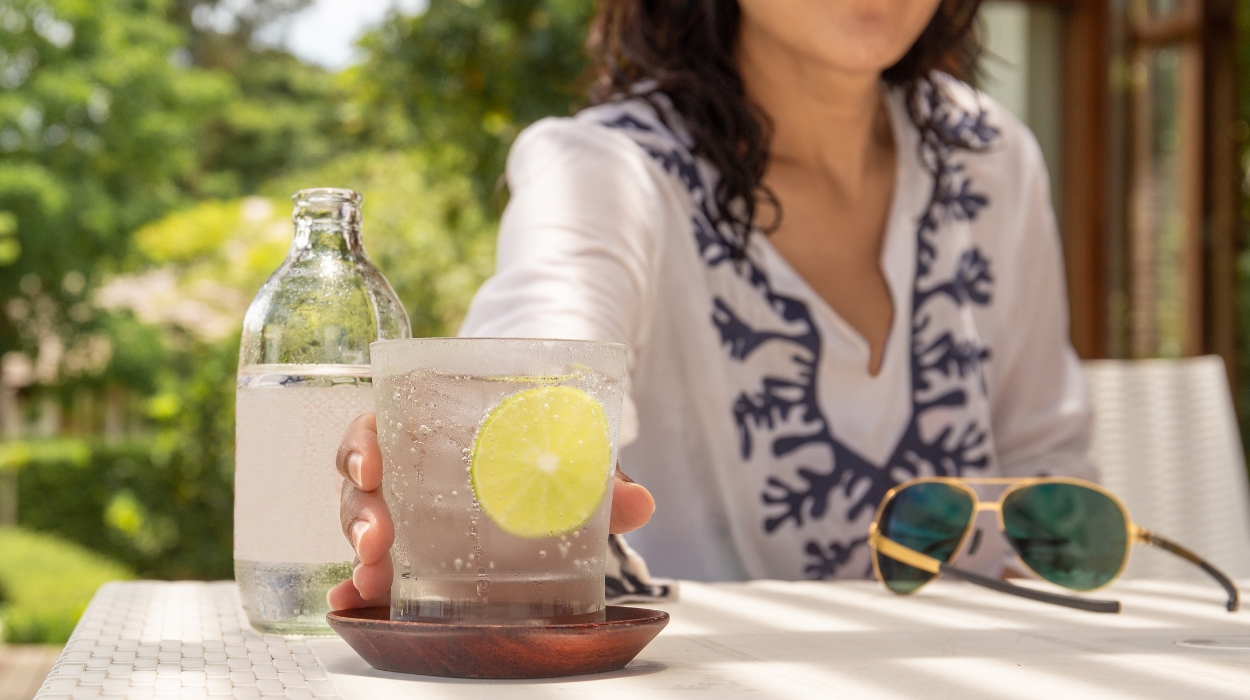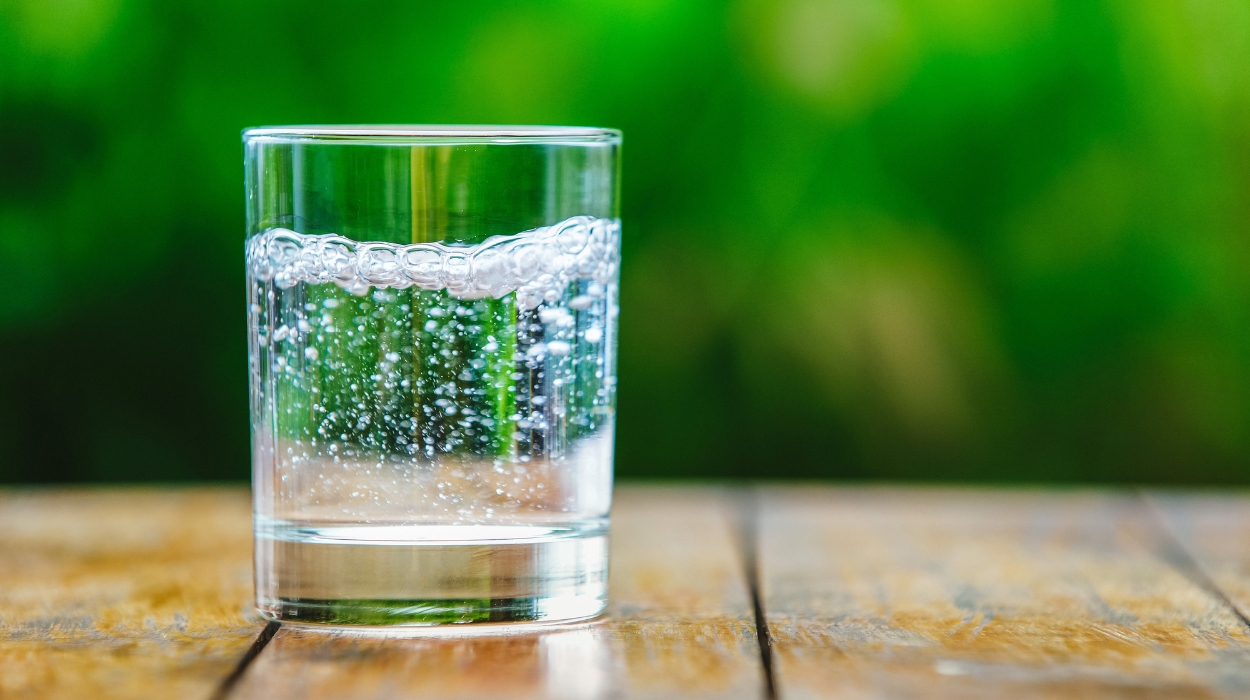One of the biggest swaps you can make to achieve healthy weight loss is substituting water in place of sugary drinks. But is sparkling water good for weight loss?
While plain water offers a wonderful way to stay hydrated and full, carbonated water might provide even more benefits. It’s also a great drink with zero calories during intermittent fasting intervals.
So, is this bubbly drink the right option for you? Below, we dig into the many benefits of sparkling water and how it can help you lose weight.
Does Sparkling Water Help You Lose Weight?
Yes, sparkling water can enhance your weight loss efforts. It can improve feelings of fullness, help replace less healthy alternatives, and keep you hydrated. However, even with sparkling water, exercise and dietary choices are important for healthy and sustainable weight loss.
Is Sparkling Water Good For Weight Loss?

Sparkling water has many different names, such as tonic water, seltzer water, club soda, soda water, and fizzy water. All in all, it’s basically the same as regular, plain water. However, plain sparkling water contains carbon dioxide gas, which causes the formation of small bubbles.
In some cases, salt and other minerals are present, depending on the source. In many ways, this can offer a healthy alternative to other drinks. But how can it contribute to losing weight?
Sparkling Water Increases Feelings Of Fullness
Unplanned snacking can derail your goals to cut calories and effectively lose weight. The truth is that these calories can add up fast, especially if it’s a pre-packaged or fast food item. Yet, the fullness of carbonated water might help you curb those cravings.
Research indicates that oral carbonation, such as in the form of carbonated water, can contribute to increased satiety.[1] In turn, this may lead to a lower daily calorie intake and, thus, less snacking.
For weight loss to occur, a calorie deficit is necessary. This can be done by increasing your daily movement and reducing your total food intake. At the same time, it’s important to note that sustainable weight loss is best achieved through a holistic approach.
This means incorporating a healthy and balanced diet, performing regular exercise, reducing stress, and more. And if you’re wondering how to lose weight, diet pills alone aren’t exactly the answer either. The key is to create sustainable habits that last a lifetime instead of making temporary changes.
Sparkling Water Hydrates You
Sparkling mineral water, like regular water, provides the body with ample hydration. Research suggests that increased hydration may cause weight loss[2] through decreased food intake and fat loss. However, more research involving larger studies would help solidify these claims.
Yet, staying properly hydrated also has many other health benefits. While we need water to stay alive, hydration may also maximize exercise performance and recovery. In fact, studies show that dehydration reduces exercise performance[3] and even impairs cognition.
Thus, sparkling water can provide the hydration you need to boost your performance in the gym or other forms of exercise. In turn, this helps maintain or improve lean muscle mass, depending on the effectiveness of the exercise or training program. This is important since maintaining lean muscle mass[4] is associated with better overall health outcomes.
Sparkling Water Provides A Great Alternative To Soft Drinks
Plain water can feel like a boring replacement for sugary drinks. Yet, zero-calorie, carbonated drinks, like sparkling water, can add a bit more excitement to your daily diet.
Adding fruit, like lemon or orange wedges, can make it even tastier. You can also add herbs like fresh rosemary, mint, or chunks of ginger.
Research shows that one of the most effective uses of water for weight loss is its ability to replace high-caloric beverages.[5] So, if you’re a regular consumer of diet soda, soft drinks, and more, sparkling water might aid your weight loss goals. It helps create a caloric deficit and reduces added sugars like high fructose corn syrup.
Other Health Benefits Of Sparkling Water

Besides weight loss, drinking soda water also has ample other health benefits. Staying hydrated improves your overall health in various ways, including improving swallowing abilities and potentially reducing constipation.
Animal studies have shown that consumption of carbonated sparkling water[6] led to prevention of metabolic syndrome in rats fed a high fructose diet. It concluded that regular consumption may prevent mineral imbalances that contribute to poor metabolic health.
For those with swallowing issues, research indicates that carbonated water may stimulate the nerves involved in swallowing.[7] Within this particular study, participants were asked to swallow different liquids. Researchers found that carbonated water had the strongest ability to stimulate the swallowing response.
Carbonated water also helps with constipation. In one study, participants drank carbonated tap water or carbonated mineral water. While both improved constipation,[8] the mineral water worked quickly.
Potential Risks Drinking Sparkling Water
Depending on the person, sparkling water can make you gassy. Yet, digestive problems are often improved by drinking this type of water, as per the above. At the same time, gas and bloating may be common if you drink too much carbonated water.
Due to its acidity, many also worry about its impact on bone health and tooth decay. However, no solid or recent evidence indicates it negatively impacts bone health.
This is because sodium, which may be found in some carbonated waters, may deplete bone density. But there’s also evidence to counter these claims. For instance, the Women’s Health Initiative study indicated that sodium intake had no effect on bone density.[9]
In terms of tooth or enamel decay, this is often only a concern if the sparkling water contains sugar. However, you can find various sparkling waters that don’t contain added sugars or flavors.
Lastly, there’s also a risk involved in drinking too much water. Water intoxication may occur with excessive water intake in a short amount of time. In the worst-case scenario, this can lead to life-threatening conditions and even death.
So, how much water should you drink? The general recommendation is six to eight cups a day.[10] This can come from plain carbonated water or non-carbonated water.
Conclusion
So, does sparkling water help you lose weight? It might, but it depends on other weight loss efforts, such as your diet, daily movement, sleep, and more.
And remember, using supplements or fat burners for women and men might only aid your journey in the short term. They are no replacement for getting the foundations of health nailed down. In other words, aim for sustainable healthy habits that you can maintain for the rest of your life.
Frequently Asked Questions
Yes, sparkling water is just as effective as normal water for adequate hydration. It can be particularly beneficial if this helps you drink adequate water as you go about your day.
The majority of carbonated waters contain zero calories. This means they shouldn’t lead to weight gain. However, weight gain or loss depends on your total calories and other lifestyle or dietary habits.
Yes; however, pay close attention to your body’s cues. For example, some may experience digestive discomforts with excessive sparkling water intake. If this happens to you, it may be beneficial to alternate between sparkling water and regular water.
This depends on various factors, such as the individual’s body weight, exercise amount, and more. While drinking water is important, you may be drinking too much if your urination frequency has increased significantly.
Soda often contains more fizz and artificial sweeteners than sparkling water. Meanwhile, sparkling water often only contains the fizz without added sugars or sweeteners.
 Evidence Based
Evidence Based
